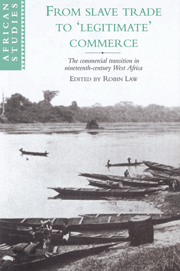 From Slave Trade to 'Legitimate' Commerce
From Slave Trade to 'Legitimate' Commerce Published online by Cambridge University Press: 21 September 2009
The ending of the Atlantic slave trade and its replacement by what contemporaries called ‘legitimate’ (i.e. non-slave) trade – principally in agricultural produce, such as palm oil and groundnuts – during the nineteenth century has been one of the central themes in the historiography of western Africa since the beginnings of serious academic study of African history in the 1950s. Basil Davidson, in his classic study of the impact of the Atlantic slave trade on Africa, published originally in 1961, held that the slave trade had had a profound and essentially destructive effect on the African societies involved in it. Paradoxically, however, he argued that the ending of the trade in the nineteenth century was also negative and disruptive in its impact:
The ending of the trade was of tremendous significance for Africans and Europeans on the Guinea Coast. It upset the trading habits of four full centuries, undermined systems of government, disrupted social customs and opened the way for European intervention.
In Davidson's analysis, the ending of the slave trade caused an ‘economic crisis’ for African societies, leading to ‘political upheaval’ in them, which in turn provoked imperialist intervention and ultimately annexation.
When Davidson was writing in 1961, there was little detailed research on the impact of the ending of the slave trade in Africa to sustain the apocalyptic picture which he painted.
To save this book to your Kindle, first ensure no-reply@cambridge.org is added to your Approved Personal Document E-mail List under your Personal Document Settings on the Manage Your Content and Devices page of your Amazon account. Then enter the ‘name’ part of your Kindle email address below. Find out more about saving to your Kindle.
Note you can select to save to either the @free.kindle.com or @kindle.com variations. ‘@free.kindle.com’ emails are free but can only be saved to your device when it is connected to wi-fi. ‘@kindle.com’ emails can be delivered even when you are not connected to wi-fi, but note that service fees apply.
Find out more about the Kindle Personal Document Service.
To save content items to your account, please confirm that you agree to abide by our usage policies. If this is the first time you use this feature, you will be asked to authorise Cambridge Core to connect with your account. Find out more about saving content to Dropbox.
To save content items to your account, please confirm that you agree to abide by our usage policies. If this is the first time you use this feature, you will be asked to authorise Cambridge Core to connect with your account. Find out more about saving content to Google Drive.